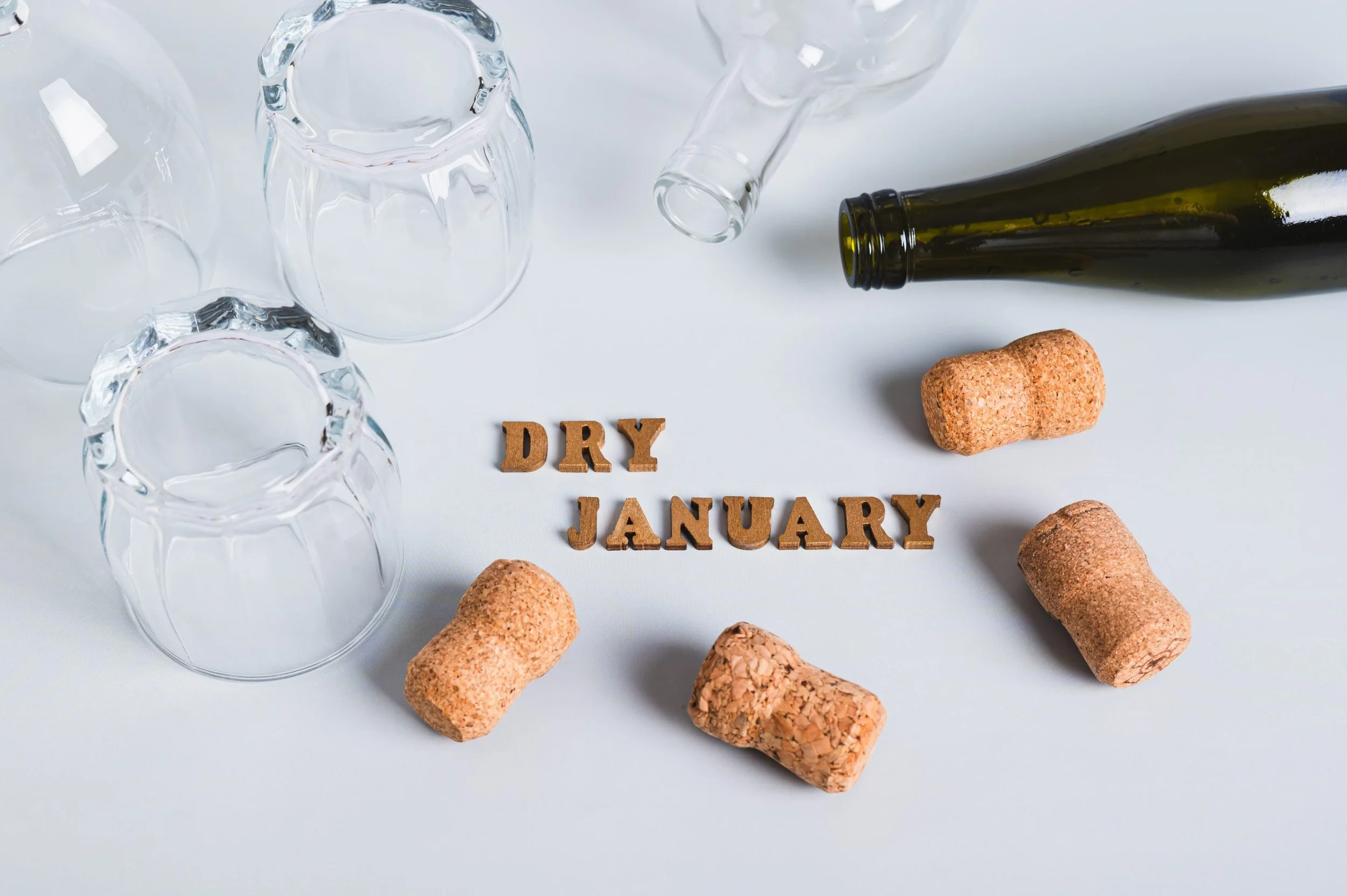Dry January & Becoming Sober Curious— the Effects Alcohol has on our Mind & Body
How Does Dry January Work?
Dry January is a 31-day challenge encouraging participants to abstain from alcohol, including beer, wine, and cocktails. Initiated in 2013 by Alcohol Change UK, a British charity, the campaign began as a public health initiative with around 4,000 participants in the UK. Today, millions worldwide take part annually, with over 175,000 participants recorded in 2023.
Key Statistics
Holiday Drinking Trends: According to the American Addiction Centers, 47% of men and 40% of women admitted to binge drinking during the festive season.
Sober-Curious Movement: In 2024, 42% of American adults identified as "sober-curious," reflecting on their alcohol consumption, up from 33% in 2022 (Civic Science).
Sober-Curious: Wikipedia defines it as a cultural movement and lifestyle of practicing none or limited alcohol consumption that started spreading in the late 2010s, in particular among people from the millennial generation, and was coined by Ruby Warrington in her 2019 book Sober Curious. It differs from traditional abstinence in that it is not founded on asceticism, religious condemnation of alcohol, or previous alcohol abuse, but is motivated by a curiosity of a sober lifestyle.
Alcohol Trends and Health Risks: Harvard Health Publishing highlights that alcohol consumption surged during the COVID-19 pandemic, the largest increase in 50 years. Alcohol misuse led to rising illnesses, hospitalizations, and deaths.
The same study reports that even before the pandemic, heavy drinking was trending upward, particularly among older adults. Approximately 25% of adults reported heavy drinking habits. Long-term drinking increases risks such as heart and liver damage, cancer, immune system suppression, memory issues, and mood disorders.
Even a 30-day break from alcohol can lead to improved sleep, increased energy, weight loss, lower blood pressure and cholesterol, and reduced cancer-related proteins, as noted in BMJ Open.
The National Institute on Alcohol Abuse and Alcoholism (NIAAA) recommends limiting alcohol to no more than 2 drinks per day for men and 1 drink per day for women.
Reported Benefits of Dry January
A 2022 study published in the Harm Reduction Journal found that participants experienced:
Improved sleep
Increased energy and physical activity
Healthier eating habits
Weight loss
Note that the statistics above list health-related concerns that alcohol has been known to cause. Less alcohol consumption may lower your risk for health concerns (both mentally and physically).
REMEMBER: alcohol is a depressant.
Exercise Makes a Difference
Statistics show that just 1in 4 adults receive the recommended amount of physical activity required. In 2016, 28% of adults got less than 150 minutes of moderate or 75 minutes of rigorous physical activity (TRVST).
How long should you exercise?
Children between 3-4 years of age should spend at least 180 minutes being physically active.
Adolescents aged between 5-17 years should involve themselves in 60 minutes of exercise each day.
Adults should strive to put in at least 150 minutes of vigorous exercise weekly.
Types of Exercises:
Strengthening Exercises: deadlifting, squats, pushups, lunges, dips, pullups, rows.
Aerobic/Cardio Exercises: running/jogging, swimming, hiking, dancing, tennis, jumping rope, yoga.
Compound Exercises: squats, deadlifts, and bench presses. Each exercise requires coordination and strength from various muscle groups, providing a comprehensive workout that enhances overall fitness.
Tips for a Successful Dry January
Harvard Health Publishing recommends the following strategies:
Opt for non-alcoholic alternatives: Stock up on sparkling water, soda, or mocktails for social situations and cravings. Hydration!
Minimize temptations: Remove alcohol from your home and bring non-alcoholic options to gatherings.
Build a support network: Join or create a group with friends and family to participate together. There's power in numbers!
Stay persistent: If you slip up, don’t be discouraged. Restart the next day and continue. Consistency is key.
Remember to keep alcohol out-of-sight out-of-mind, find hobbies or groups to keep you busy, and stick with it!
Reflect on Your Drinking Habits
Harvard Health Publishing also suggests using Dry January as an opportunity to reassess your relationship with alcohol. Many participants find they lose the urge to drink and adopt a healthier attitude toward alcohol as an occasional treat. If you enjoy the benefits, consider extending your alcohol-free period or embracing a more mindful approach to drinking.
For those who struggle to complete the month or find it challenging to reduce alcohol consumption, seeking help may be beneficial. Talk to a healthcare provider or connect with a local behavioral health facility for guidance.
Be Aware of Potential Withdrawal Symptoms
Dry January can uncover signs of alcohol dependence. Symptoms of withdrawal can range from mild to severe:
Mild symptoms: Anxiety, shakiness, headache, nausea, vomiting, sweating, and insomnia.
Severe symptoms: Hallucinations, delirium, rapid heart rate, and fever, often appearing within 2-3 days of stopping alcohol.
How to Get Involved
Alcohol Change UK offers a free app called Try Dry, which is available on the Apple App Store and Google Play Store. The app enables users to track alcohol-free days, monitor well-being (e.g., mood and sleep), set goals, and calculate money saved.
You can participate just by abstaining from alcohol consumption but be mindful of the power of tracking your progress and having a support system in place! It can help you push forward.
Need Support with Alcohol Use?
If you or someone you know struggles with alcohol, reach out to the Substance Abuse and Mental Health Services Administration (SAMHSA) by calling 1-800-662-4357 or texting your ZIP code to 435-748 for free, confidential help.
The Rethinking Drinking website, created by the National Institute on Alcohol Abuse and Alcoholism (NIAAA), is another excellent resource.
Local Support:
Wayne Behavioral Health Network (WBHN): 315-946-5722
Open Access Center at WBHN: 315-946-5750
Council on Alcoholism and Addictions of the Finger Lakes (CAAFL): 315-871-4006
Finger Lakes Area Counseling & Recovery Agency (FLACRA): 315-331-7400



